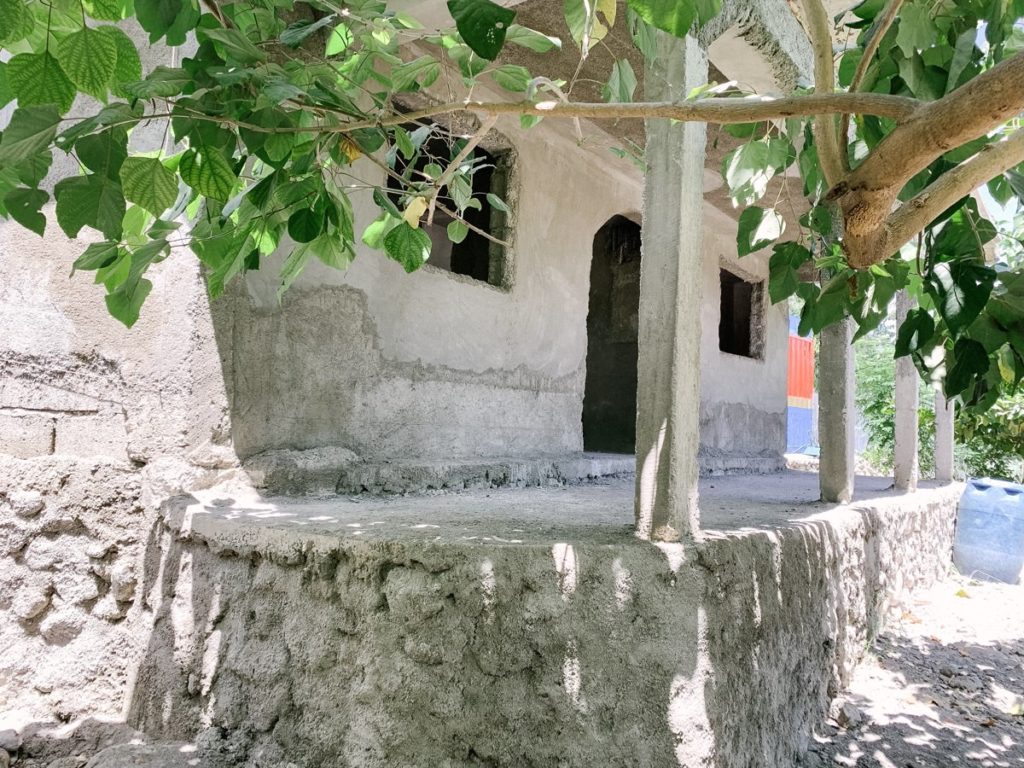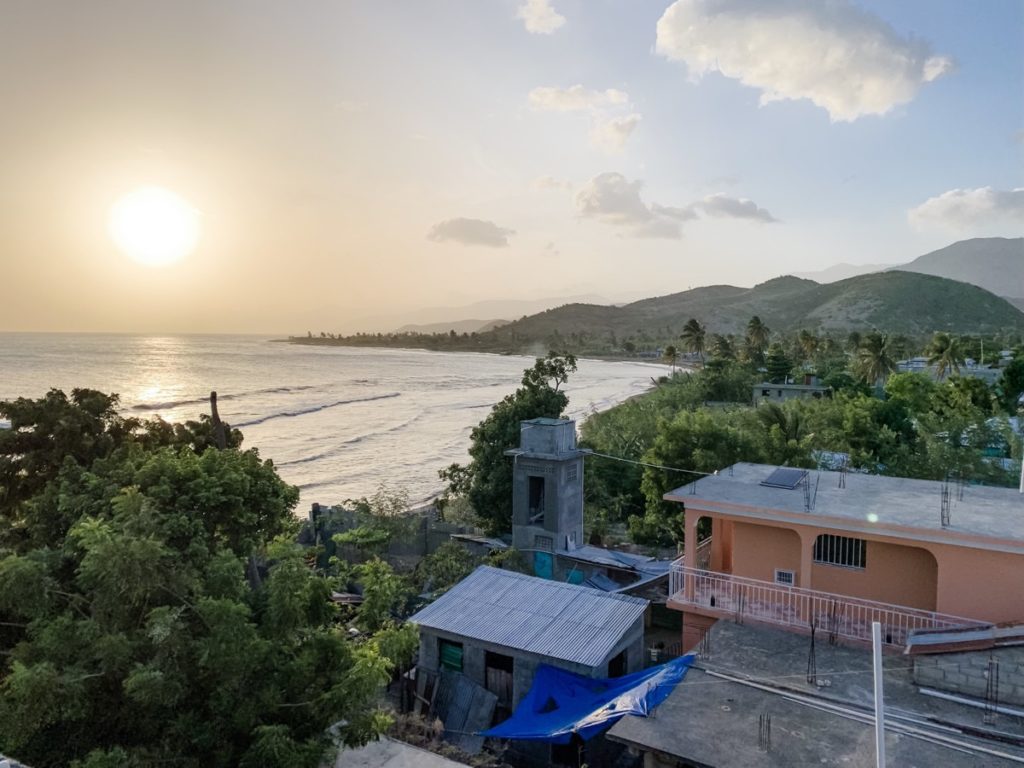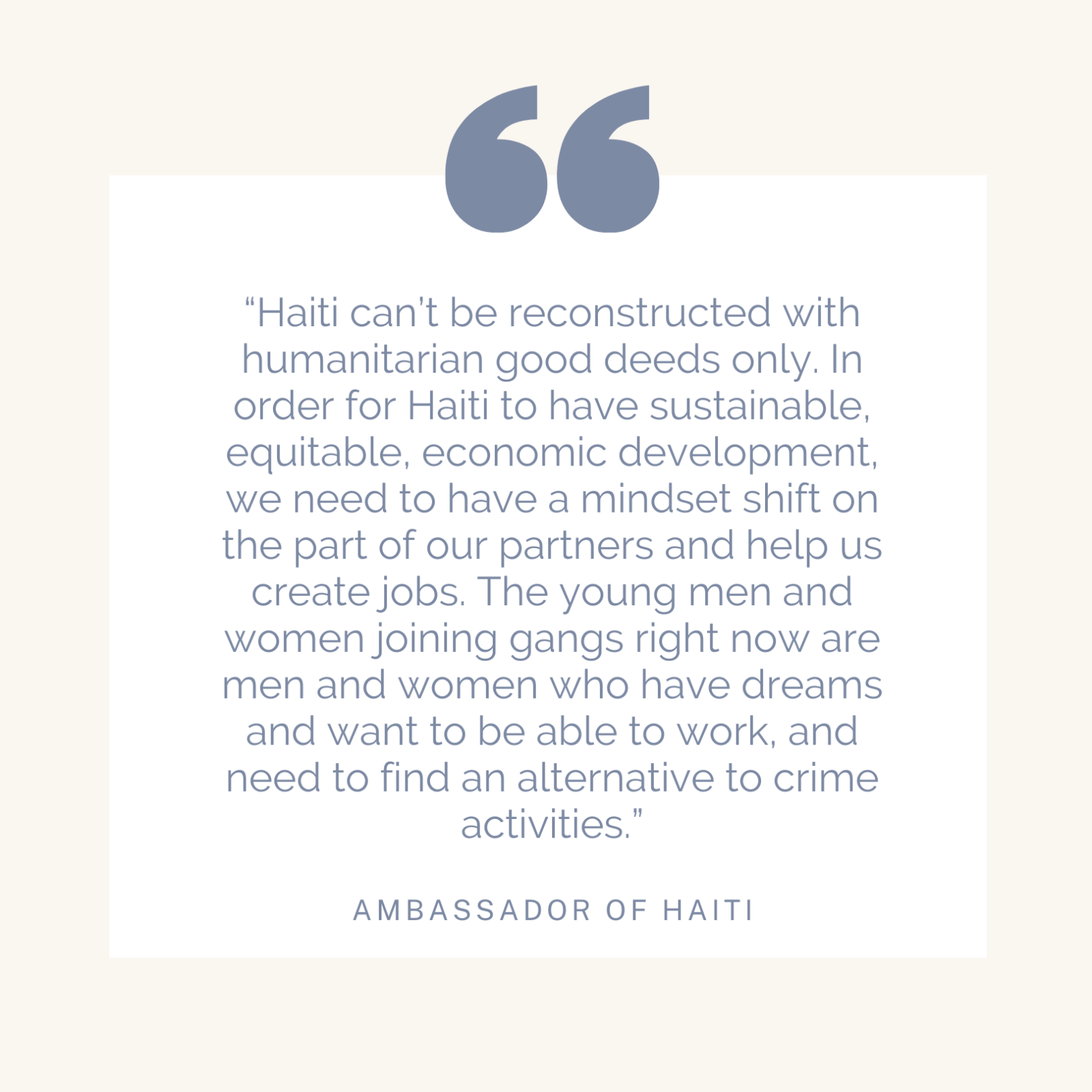Have you been keeping up with recent events in Haiti? Maybe?
If it’s been hard to follow, I don’t blame you! So much has happened in the last few months that it’s almost unfathomable…It’s downright scary, if you ask me.
If you’ve been following along the last few years, you know I’ve personally been quite involved in Haiti, and as a result you have too! You’ve engaged in conversations, donated to projects, and even joined me on trips! Even though we aren’t able to visit the same community in Haiti any longer, my heart is still there. And since you’ve been following alongside the country for so long too, I thought it appropriate to discuss some of the really dark things Haiti is walking through right now. We often talk about the progress they are making, but we can’t understand progress without understanding their challenges too.
This post includes a summary of events in recent months, root-cause factors leading to these events, and ways to move forward - all based on my own research. It may not be completely comprehensive, but it’s a quick recap that I think you’ll find interesting without having to do all the research yourself! Don’t forget to read until the end, because I’m highlighting a way you can help influence this dark situation yourself!
(If you find something I’ve missed, please leave a comment below to discuss!)
Interestingly, as I dug deeper into understanding what’s at play in Haiti, “unhealthy giving” was a theme that continued to pop-up as one of the many underlying forces leading to where Haiti is today. More on that later.

What are the big issues Haiti is facing right now?
1.) Earthquake aftermath and tropical storms
This summer’s earthquake that hit the southern coast of Haiti sent the country into a spiral. Lives were lost, along with livestock, homes, schools, churches, and more. Hospitals damaged by the storm were trying to treat injured patients, in addition to patients with Covid. Tropical storms soon followed the earthquake, making matters worse with major flooding. Supplies were limited and aid flooded Haiti too.
2.) Assassination of the President
The assassination of the Haitian President Jovenel Moïse lead the country into greater unrest and distrust of the government. Haiti has a very deep-rooted history in corruption and mis-guided government with motives to line their own pockets while keeping the rest of the country in poverty.
3.) Security issues
Gang violence has been an ongoing issue in Haiti that has increased in recent months. The 400 Mawozo Gang currently controls much of Port-au-Prince. It was said the Haitian people live in fear everyday, which is a new way of living. Every time they leave home, it’s uncertain whether they’ll return. Demonstrations break out regularly, they could get caught in the crossfire of gang warfare, or they could be kidnapped…I can’t imagine - it’s like a horrible horror movie, but worse, because It’s real.
4.) Influx of weapons into Haiti
There have been an influx of weapons into Haiti, many apparently from the U.S. I learned, which have literally given ammunition to the gangs and furthered violence.
5.) Unreliable power and water; fuel shortages
Haiti deals with unreliable power and water on a regular basis. Now there are fuel shortages due to a coalition of gangs called “G9” who will not let fuel trucks pass on roads to deliver fuel. It’s a tactic they are using to try to force the Prime Minister to step down from office. In the meantime, many fuel truck drivers are getting abducted and even killed while trying to deliver fuel. The fuel shortages have put a strain on normal operations as hospitals need it to keep Covid patients alive and people use fuel for generators when the power goes out. It’s also put a strain on transport of people and supplies, and has even forced some businesses to close.
6.) Growing Social Unrest
There continues to be increasing protests, riots, demonstrations, and tires burning in the streets. The government has been virtually non-existent and they are demanding the government to "actually govern" and implement security measures. In addition, the Haitian people do not trust the government due to a history of deep-rooted corruption. The people are calling for Prime Minister Claude Joseph to step down from his interim position as leader of the country after the President’s death. There is belief that he carries similar views on policy as President Jovenel Moïse, and that he wishes to maintain control of the country. According to the New York Times, “The country’s prime minister was linked to the president’s assassination” too.
7.) Kidnapping
Headlines broke news last month of The 400 Mawozo Gang’s kidnapping of 16 Americans and 1 Canadian, including 5 children. They are threatening a $1 million ransom for each, or they will be killed. In my research I found kidnapping to be a reality for Haitians every day. According to Aljazeera, “Haiti has the worlds highest number of kidnappings per person” and Abductions surged 300% this year with 628 in 2021 compared to 231 last year. In response to these recent kidnappings, Haitian protests broke out in support of the release of the 17 abductees. The Haitian people are upset, because the missionaries were helping them in ways the government wasn’t, and now they are captured and the government hasn’t been able to take control of the situation.
8.) Social Economic Issues
It almost goes without saying there are unfortunately huge social economic issues stemming in a large part from many of the issues listed above.

What’s lead them here?
Of course, there are SO many angles to this question with a long history of events that have lead Haiti to where they are today. However, according to this 25 minute video published by Inside Story, there are two major root-factors involved here.
1.) Lack of police force
According to the video interview, Haiti’s military army was disbanded in 1995 and the UN subsequently came in with an international militarized force to support the Haitian government and stabilize Haiti’s national police. The UN’s presence in Haiti ended in 2017 with plans for the National Police to take over. However, it sounds as though the National Police needs additional support and resources to be effective.
2.) Unhealthy giving
We’ve discussed the concept of “Helping Without Hurting” for years through this platform. As we watch recent events unfold in Haiti, I can’t help but see the interesting correlation between unhealthy giving and Haiti’s current state.
In the same video it was explained that traditional forms of international aid coming into Haiti has actually undermined the local government’s ability to help, and instead has increased their absence, causing a lack of opportunities in Haiti. They sited duplication of NGO’s doing things that didn’t need to be done as an issue as well.
As the Ambassador of Haiti said, “We need to listen to Haitian people. Whether it’s the Haitian government or Haitian people that are telling international donors this is what we need…When we say this is what we need, it’s because we have first-hand experience and knowledge of the matter.”
These types of outcomes are exactly what we’ve learned happens when unhealthy giving is taking place. While it’s not the only culprit, unhealthy giving is a contributing factor to Haiti’s issues today.
So, what to do?
These items were cited as being ways Haiti can work to move forward.
1.) Self-governance & security
It was said many times that the Haitian people want to have their destiny in their own hands. They want a reinforced police force and an army presence. They want support in self-governance and security.
2.) Intercept gang networks
Interestingly, the distinction was made that rather than funding the police force, they need to go after the networks of support for the gangs in Haiti to stop the violence. Which makes sense! It was said, there are 26 families providing weapons to the gangs, and the Haitian government needs to hold them accountable. They also need to better control and stop arms trafficking and money transfers coming into Haiti that are funding the gangs.
3.) Create jobs
International partners should focus on investment and market capital financing initiatives. As the Ambassador of Haiti said, “Haiti can’t be reconstructed with humanitarian good deeds only. In order for Haiti to have sustainable, equitable, economic development, we need to have a mindset shift on the part of our partners and help us create jobs. The young men and women joining gangs right now are men and women who have dreams and want to be able to work, and need to find an alternative to crime activities.”

Is there hope?
The issues Haiti faces are enormous. If you’re like me, you probably can’t imagine what they’re enduring…And while there doesn’t appear to be one immediate solution, we can cling to hope. Even while many are suffering, we can know God has a redemptive plan for Haiti. In the end, it will all make sense. Yet, it’s the in-between that seems almost unfathomable, right? We don’t want to see them suffer. We don’t want to see all the evil, fear and unjust acts sweeping Haiti. The issues seem too big to fix…
Yet, there is light to be found! Perhaps these challenges will force Haiti and the global community to make changes that are good for the country. While difficult, perhaps this is a period of refinement. The people of Haiti wish to have more autonomy of their futures. They are calling on global donors and aid organizations to give differently and shift their giving mindsets. Of course, this won’t solve everything, but I believe it’s a piece to the puzzle. Perhaps with enough pieces, we’ll see a beautiful, liberated Haiti one day!
You can be a part of the solution!
Giving begins with us, doesn’t it? We donate to organizations who serve people in Haiti and around the world! That means, being mindful about how organizations serve before giving is a huge part of the puzzle! We can choose to support organizations who are walking alongside people allowing them autonomy to make their own choices. When we choose to support these organizations, we’re affirming their positive model, and holding the others accountable.
If you’d like to learn how to “Help without Hurting”, here are a few resources to get started:
- Helping without Hurting in Short-term Missions by Steve Corbett and Brian Fikkert (this comes with great videos and questions to help you understand and learn the concept!)
- When Helping Hurts - This approaches poverty alleviation from a biblical perspective, while focusing heavily on tangible examples of how to help the poor without hurting them.
- Toxic Charity - This is a quick read and focuses on similar techniques of When Helping Hurts with less emphasis on biblical worldview.
- Rethink Missions Toolkit published by PovertyCure (I’m part of the PovertyCure network and I’d highly recommend this toolkit too!)
- If you haven’t watched the multi-awarded documentary called, Poverty, Inc., you’ll want to check that out too! It draws upon over 200 interviews filmed in 20 countries, showing what happens when we approach poverty alleviation incorrectly. There’s a big section highlighting Haiti and what’s happened to the country because of unhealthy giving.
Haiti certainly has much to overcome, and while it seems nearly impossible, I believe there is hope. This hope lies in first identifying the underlying root-causes, and working to rebuild what’s been lost. We can be empowered to do our part in “helping without hurting” too! Ultimately, I have hope in God’s ability to redeem what has been lost and bring light to Haiti!

The above resources are linked to my Amazon account. As an Amazon Associate I earn from qualifying purchases. Thank you for helping me help you!
Sources:
NY Times https://www.nytimes.com/2021/10/16/world/americas/missionaries-kidnap-haiti.html
NBC News https://www.youtube.com/watch?v=rYqoeP7WnHk
Aljazeera https://www.aljazeera.com/news/2021/10/21/haiti-gang-leader-threatens-to-kill-american-hostages
NY Times https://www.nytimes.com/2021/09/16/world/americas/haiti-president-politics.html
AP News https://apnews.com/article/business-religion-prayer-haiti-amish-aea0e0d75f6465186e925628a3042ac7
Other blog posts to learn more about this topic:
How to Help the Materially Poor Without Hurting Them
Empowering Nations with The 410 Bridge
Why I Choose to Lead Mission Trips, Despite Their High Opportunity Cost
Be the first to comment